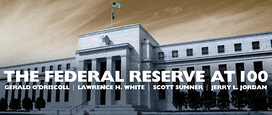In a recent post, Larry White usefully reviews a previous occasion that the gross US national debt exceeded the nation’s GDP—the end of World War II. Thanks in part to inflation created by the central bank, in only a quarter century the debt-to-GDP ratio had fallen to only 40%. But while it is important to know this history, it is also important to be careful in the lessons we draw from it.
First, we are not going to see a similar drop in debt-to-GDP in the next quarter century. Why? Because when the war ended, so did the deficits. Larry’s central point is that the debt-to-GDP ratio did not fall to only 40% because the government was running surpluses and paying off the debt. What happened was that a still-large nominal debt became a smaller share of a much bigger GDP, thanks to inflation. However, it was also a period of rapid real economic growth compared to what we are now experiencing.
Today we face far different circumstances: population is growing much more slowly, it is aging rapidly, and the share of adults that are even in the work force has fallen back to the lowest level in over thirty years. Thanks to anti-supply-side taxation and regulatory policies of the national and some of the state governments, a faster pace of real growth will not occur any time soon.
Maybe more worrisome, unlike the end of the war when government stopped deficit spending that was adding to the debt, we now have in place fiscal policies that will be generating large deficits and adding on more debt for years to come. In 1946 we did not face massive unfunded obligations in social security and healthcare programs for seniors, now we do. In 1946 we were at the beginning of several decades of shrinking defense spending as a share of GDP; now we could cut military spending to zero and it would not improve our bleak fiscal outlook.
It also would be an incorrect lesson from history to think that central bank created inflation did not have other adverse consequences. Inflation is a tax that is highly regressive—it worsens the income distribution because low-income people are more likely to rent their homes and have little long-term debt. Inflation transfers wealth from creditors to debtors. Government, as the biggest debtor, certainly gains, but people who have significant real assets such as their homes financed by fixed-rate long-term debt also are on the receiving end of the wealth transfer.
Inflation is a dishonest, divisive, regressive form of taxation—yet politicians prefer to impose it rather than cut spending or raise explicit tax revenue to cover the level of spending. The maxim is, a society that cannot or will not achieve and maintain fiscal discipline will not maintain monetary discipline.

